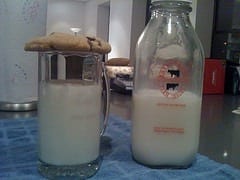Our days of crying over spoiled milk could be over, thanks to Cornell food scientists.
Milk undergoes heat treatment — pasteurization — to kill off microbes that can cause food spoilage and disease, but certain bacterial strains can survive this heat shock as spores and cause milk to curdle in storage.
Researchers in the Milk Quality Improvement Program at Cornell’s College of Agriculture and Life Sciences have identified the predominant spore-forming bacteria in milk and their unique enzyme activity, knowledge that can now be used to protect the quality and shelf life of dairy products.
“Control of food spoilage is critical in a world that needs to feed 7 billion people,” said Martin Wiedmann, food science professor and study co-author. “Approximately 25 percent of post-harvest food is spoiled by microbes before it is consumed.”
The study, published in the March issue of Applied Environmental Microbiology by the lab of Wiedmann and Kathryn Boor, the Ronald P. Lynch Dean of the College of Agriculture and Life Sciences, identified the predominant strains of spore-forming bacteria, which can foul milk and other food products. The culprits, Paenibacillus bacteria, are ubiquitous in nature and cause off-flavors in a variety of foods and curdling in dairy products.
As spores, the bacteria can survive in dormant form for years despite the best practices in cleaning, processing and packaging.
In fact, the bacteria may be uniquely adapted to overcome the twin tactics of dairy protection: pasteurization followed by refrigeration. According to co-author and research support specialist Nicole Martin, the spores are not only resistant to heat, the small jolt of heat during pasteurization may actually stimulate them to germinate. Some can reproduce in refrigerated dairy products at temperatures that would stymy other types of bacteria.
“We studied 1,288 bacterial isolates in raw milk, pasteurized milk and the dairy farm environment; however, only a handful of strains accounted for 80 percent of the spore-formers present,” said Wiedmann. “They grow well in milk — and possibly other foods — at temperatures as low as 43 F, and we can identify Paenibacillus because of their uniquely high galactosidase enzyme activity at 32 C.”
They also investigated how pasteurization affects the presence of such bacteria.
via Cornell University – Stacey Shackford
The Latest Streaming News: bacterial spoilers updated minute-by-minute








